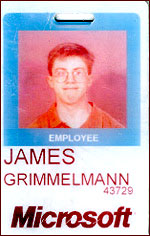James Grimmelmann is a resident of Seattle, Wash., a software design engineer with the Microsoft Corporation, and the madman behind The Laboratorium.

Monday, 30 Oct 2000
SEATTLE, Wash.
I’ve worked at Microsoft for a year and half total, and in that time I’ve received two spider Koosh balls (Kooshes with only 20 or so hairs, giving them the lean look of predators), three twisty link toys, an indoor Frisbee, a magnetic poetry kit, a high-bouncing rubber ball with a motion sensor and microchip inside (when bounced, it flashes and makes a loud breaking noise; now banned from lectures at MIT), two fleece pullovers, a reversible vest, a propeller beanie, four coffee mugs, a miniature globe, a Koosh yo-yo, a hard plastic noisemaker shaped like a hand, two bumper stickers, a picnic backpack (containing a blanket, a carving board, complete place settings for two, salt and pepper shakers, wine glasses, and a bottle opener), an oversize hardbound book, boxed copies of three different Microsoft products, a bottle of “Microsoft Brainwash” cola, two water bottles, and ten T-shirts.
The question one naturally tends to ask is, “Why does a software company need so much stuff?“

Microsoft is, by and large, a pretty responsible corporation, and I’ve been continually struck by how well plugged-in and environmentally conscious the people I work with are. Unlike at Silicon Valley companies, conspicuous personal consumption is discouraged; there are surprisingly few sports cars in the parking lot. Those who have it don’t flaunt it. Individualism at the expense of hierarchy is encouraged, but everything else is communitarian. Everyone gets the same office, the same office furniture, the same computers, the same perks. And this also means they get the same useless freebies — and the same recycling bins. Microsoft’s push toward conservation and its encouragement of waste are flip sides of the same coin.
Take the computer pool as an example. Your computer comes from some unknown source and returns from whence it came when you don’t need it any more. Your old computer too slow? PC-Recycle will come pick it up and give it to someone who doesn’t need a super-fast computer; meanwhile, your group admin will quietly see to it that a shining new dual-proc 800 GHz Pentium III shows up in your office. How does it work behind the scenes? Nobody knows. The magic computer elves take care of it. What happens to the aluminum cans collected from the gray bucket in your office once weekly? The magic soda can elves who keep the fridges stocked with free soda take care of it. The supplies in the copy room? Magic copy paper elves.
On the one hand, Microsoft is fairly clearly doing the right thing with the resources that pass through its control: I need to separate my trash more carefully at the office than I do at home. The office lights go off at night unless some night owl specifically turns them back on (and then only in single-hallway increments). The same desk units will be reused into the next century. On the other, this sort of zero-exertion everything-you-need policy creates a certain concomitant complacency. Grab a knife with lunch even if you don’t need it: It’s going back into the polystyrene bin afterwards, so there’s no harm done! Your desktop machine is only 600 GHz? Come on, man, why are we wasting your time during compilation like that, let’s get you a new one and put the old one back in the pool! I’m just flipping the switch that turns my office light on, what harm is there in that?
These are somewhat trivial examples, but the problem is that Microsoft corporate culture, as typified by the truckloads of freebies, pushes us into a communal mode of mass consumption. Young and otherwise environmentally conscious people with a little too much cash can be swayed by an environment in which nothing physical should ever be difficult and where there are “free stuff for everyone!” days every month. Softies don’t often buy SUVs to show up their neighbors, but sometimes they buy them to fit in with the other Softies who own one. Strangely Spartan in their home furnishings they may be, but they’ll impulse-buy the new generation of every consumer-electronic device that might save them five minutes a day. It’s not a bad life to live, but not everyone can live this way — a bit of perspective it’s easy to lose track of when you’re making as much as your parents in your first job out of college. Context doesn’t always come easily. We’re working on it, but there’re still some areas for improvement, as the performance review forms say.
One final note: If anyone wants the backpack and picnic kit, they’re yours. First email gets the lot, plus hand-delivery if you’re in Seattle. I’d like to see them get some use.

